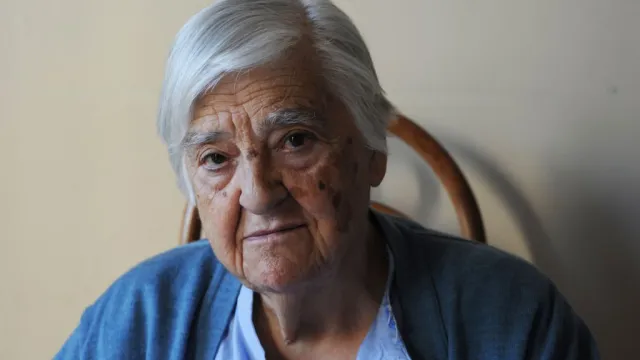In 2003, the multidisciplinary craftsman was depicted as ‘arguably the most celebrated and finished Arab-American creator composing today’
Monday’s energized Google Doodle celebrates Lebanese-American writer and craftsman, Etel Adnan, who is considered one of the most fulfilled Arab-American creators of her era.
She was best known for her assorted and multidisciplinary work, which included verse, oil canvases, movies, form and tapestries.
On this day in 1955, she facilitated her to begin with solo presentation in San Rafael, California.
Who was Etel Adnan?

Etel Adnan was born in Beirut, Lebanon, on February 24, 1925.
The daughter of a Greek mother and a Turkish father, Adnan, talked Greek and Turkish at home, went to a French-dialect school and lived in a fundamentally Arabic-speaking country.
At the age of 23, she moved to France to think about reasoning at the College of Paris, and some time later she moved to the US for graduate pondering at the College of California, Berkeley, and Harvard. From 1958 to 1972, she taught logic of craftsmanship at the Dominican College of California in San Rafael.
After settling in Sausalito, Adnan started to make canvases. She said that “colours exist for me as substances in themselves, as supernatural creatures, like the properties of God exist as supernatural entities.”. This got to be a key precept of her work.
Adnan inevitably returned to Lebanon to work as a writer and editor for the daily papers Al Safa and L’Orient le Jour, where she made a difference by creating an area devoted to culture in Lebanon and the Middle East.
As time went on, she started to pick up far reaching acclaim for her dynamic theoretical canvases, which were motivated by the scenes of California and Lebanon.
Today, her craftsmanship can be found in exhibition halls and displays all over the world, from Paris to Beirut, Hong Kong to London, and beyond.
In describing her craftsmanship in a meeting with Laure Adler distributed in the Paris Survey, Adnan said that there was “power in color.”.
She said, “Mixing colours has exceptionally locked in since you witnessed the birth of a modern colour. It’s truly a birth, like a child arriving. You put in a specific ruddy, you put in a white, and you have a pink that you’ve never seen some time recently, and that makes a difference with the taking after organizing. I play by ear, as they say.”
She proceeded: “I had absolutely scholarly instruction, exceptionally scholarly. But that makes a difference in doing another kind of craftsmanship. Whether it be music or verse, it makes a difference. It trains you. They’re the same issues. They’re issues of composition and confidence.
“When you walk down the road, you don’t think about the next step. You should go for it. It’s the same with work. You start, and you proceed. You must have certainty. You can’t have feedback interceding throughout the work. You have to take off feedback afterward. And at that point, you require a certain unobtrusiveness. This is what I can do. I’m obliged to acknowledge it. It’s me.”
Adnan was recognized as a lesbian in her afterward a long time and went through much of her life with the Lebanese-American craftsman, Simone Fattal.
She passed on in Paris on November 14, 2021, at the age of 96.
What are her most celebrated works?
In 1977, she was granted the France-Pays Arabes grant for her novel Sitt Marie Rose. It tells the story of a lady snatched by a volunteer army amid the Gracious War in Lebanon and is considered a classic of war literature.
In 2010, she was granted the Middle Eastern American Book Grant for her brief story collection, Ace of the Overshadow. The collection incorporates stories about relocation, cherishment, misfortune, verse, and war.
In 2013, her verse collection Ocean and Haze won both the California Book Grant for Verse and the Lambda Scholarly Grant in the Lesbian Verse category.
In 2014, she was named a Chevalier des Expressions et des Lettres by the French Government.
In 2020, the verse collection Time, including determinations of Adnan’s work, won the Griffin Verse Prize.
In 2003, she was named “arguably the most celebrated and fulfilled Arab-American creator composing today” by the scholastic diary MELUS: Multi-Ethnic Writing of the Joined Together States.
Asked when she caught on that she may too compose verse, she answered, “Oh, I’ve never thought that! I have never said I was a writer, for instance, but when I composed my first sonnet, when I was 20, it was a long time ago. It was almost the marriage of the sun and the ocean. And it’s clever; my most later lyrics have about the same subjects as the to-be-beginning ones, which never got to be books.”






